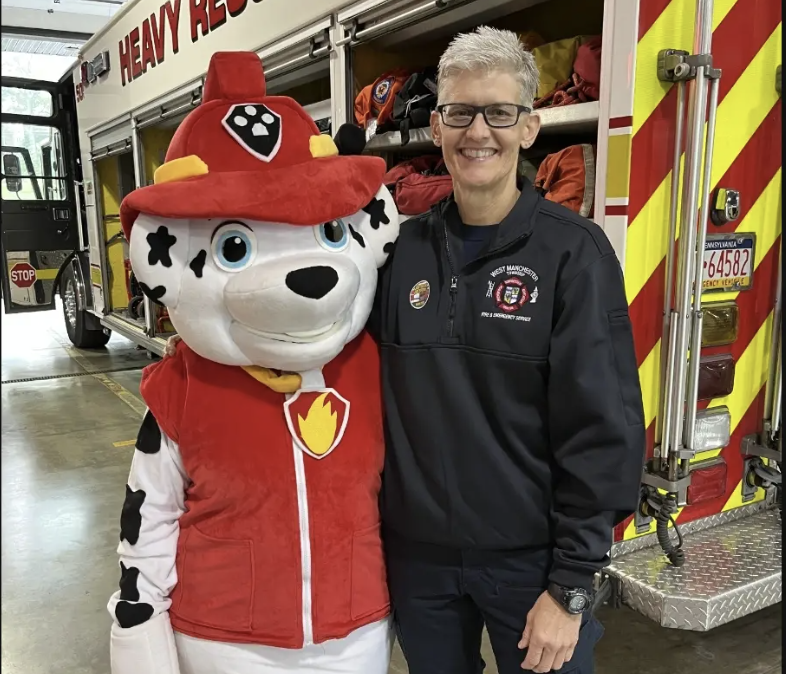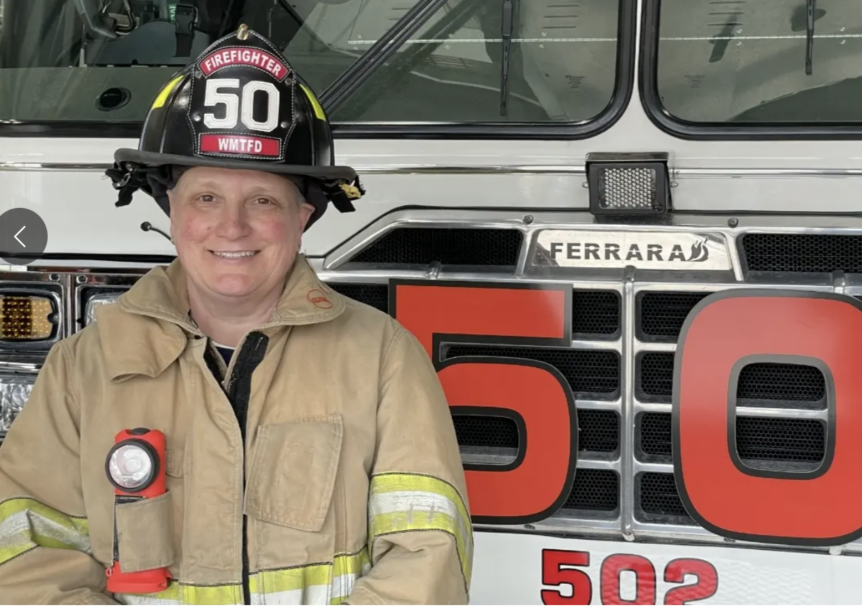 Until recently, firefighting has been considered a man’s job. But that’s been changing. In the past twenty years the ranks of female firefighters have grown in the U.S. from 2% to 11%.
Until recently, firefighting has been considered a man’s job. But that’s been changing. In the past twenty years the ranks of female firefighters have grown in the U.S. from 2% to 11%.
Women firefighters have proven that they are just as capable as men of doing the strenuous and dangerous work of fighting fires. And they have reaped the satisfaction of serving people at their times of greatest need and becoming part of a team that always has each other’s backs.
West Manchester Fire Department celebrates its women firefighters.
Says West Manchester Fire Chief Cliff Laughman, “We have a long history of female firefighters in our Department and are proud of them. We invite more women to join us in protecting the lives and property of those in our community.”
Michelle Coletti-Iacono At 53, Michelle loves the mental and physical challenges of firefighting
Michelle Iacono became a firefighter in 1993 and has volunteered for the West Manchester Fire Department for 18 years.
Since she was a child, she has looked up to firefighters and admired their service to the community. When she met Roxie Tate, a senior firefighter with West Manchester, Tate told her about her experiences as a firefighter and encouraged her to join. Colleti-Iacono decided to do it, even though she wasn’t certain she had what it took. After she joined, she worried that the male firefighters might have doubts about her too.
Coletti-Iacono was driven to prove that she could do the job, and she quickly did.
She cherishes being part of the West Manchester family—they are always there for each other. “Putting your life on the line together builds trust and loyalty like nothing else. We support each other as firefighters as well as with our personal problems—we cook, shovel snow, listen to each other, whatever is needed,” says Coletti-Iacono.
She embraces the mental and physical challenges of firefighting and at 53 continues to learn, build new skills, and attain certifications. Earlier in her career, she became a certified rescue technicians to perform rescues when fire apparatus can’t be used and ropes are required.
At 5’4”, Coletti-Iacono is small for a firefighter. That proved to be an advantage when a quarry dump truck got wedged in an overpass and the driver had to be removed. She squeezed into the cab and extracted him while also protecting him from spinal injury and other harm.
Her message to other women interested in firefighting is to “go for it.” Things have changed since she first became a firefighter, men have gotten used to working with women and know that women can do the work. “But we have to prove ourselves just as men do.”
There are times when she’s with an all-female crew responding to a call. “When people are surprised, we love it.”
Roxie Tate “I tell young firefighters that failure is not an option”
Growing up, Roxie Tate’s older brother, Sterling, wanted her to do everything that he did. When Sterling played baseball as a kid, he pushed Roxie to play, even though she was the only girl on the team. When he became a volunteer firefighter, he told Roxie that she had to join.
Tate’s parents raised her to believe that being female wasn’t an obstacle to doing anything she set her mind to. She was very athletic, played lots of sports, and her brother pushed her to be good at whatever she did. She has always had confidence in herself.
So, in 1979, at the age of 14, she became a junior firefighter—the first female at the West Manchester Fire Department.
When Tate at 18 became a senior firefighter, “there were no training or certification requirements to do the job like there are today, you learned on the job watching others,” she says.
Shortly after she started, she responded to a house fire in which a woman was trapped inside. When firefighters at the scene couldn’t find the woman, the Assistant Chief told Tate to go into the house and look in a different direction from the others. At the time, she was taught that if you can’t see your hands, get down on the ground, and crawl along a wall. Even though Tate thought she might die in there, she stayed focused, found the woman, and got her out of the house.
This experience will always stand out for her because she was so green and the Assistant Chief had confidence in her to do the job.
As a female firefighter, Tate never saw herself as any different from the men and never felt that the men saw her differently either. She took training classes on her own and then trained a lot of the firefighters. Over her first 20 years with the Department, she climbed the leadership ladder becoming a Lieutenant, then Captain, and eventually Assistant Chief at West Manchester.
In 2000, Tate left firefighting, but returned in 2020 at the age of 54. Today, at 57, she works out daily—cardio, weights, and stretching—just as she always has. She loves the physical challenges of the job and continues to do the same firefighting tasks that she’s always done.
And she loves being part of the team. Says Tate, “It’s amazing to be surrounded by such great people. There’s no stronger bond than those among firefighters. We will do anything for each other.”
The most gratifying part of her work today is training and mentoring new firefighters. They trust her and talk to her about anything and everything in their lives—from their challenges with firefighting to helping them stick to their budgets and find new jobs.
“I push them hard and make them see that they can do things that they don’t think they can. When someone wants to quit because of self-doubt, I tell them that they must get that thought right out of their heads,” says Tate.
She will work with them as long as it takes and knows that without her folks who are now successful firefighters wouldn’t have made it. “My greatest satisfaction is to watching others achieve their goals.”
Tate says that she’s had the pleasure of working with numerous female firefighters over the years. To girls and women considering firefighting she says, “if you’re interested in the work, you should try it. Bring the right mindset and you’ll attain the skills and knowledge you need. Failure is not an option.”
Recognizing that women don’t typically have the same physical strength as men, she says, “we have to work hard—eat and sleep well, exercise, and take care of ourselves. If we want it and are willing to do the work, we can do it.”
If you’re looking to make a difference, stretch yourself, and join team members who always have your back, West Manchester Fire Department is the place for you. We will train you, gear you up, and welcome you into our firefighting family!

